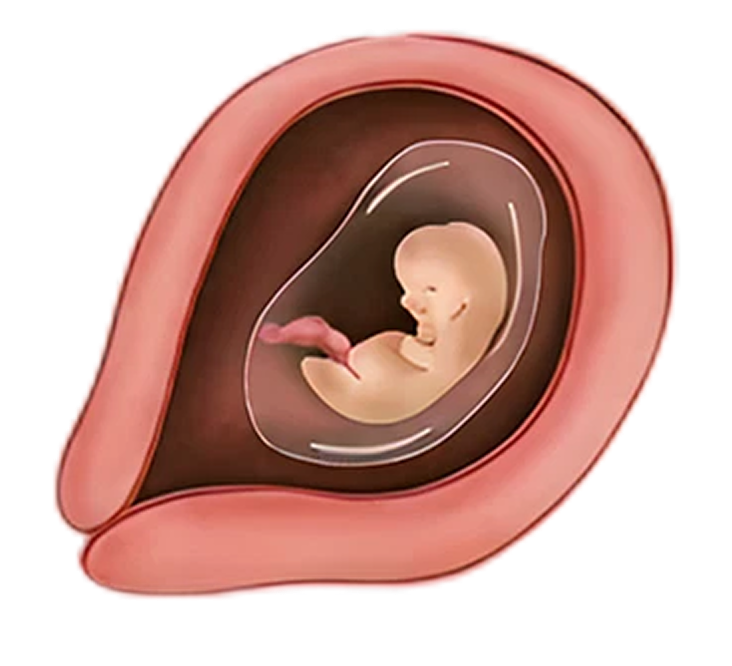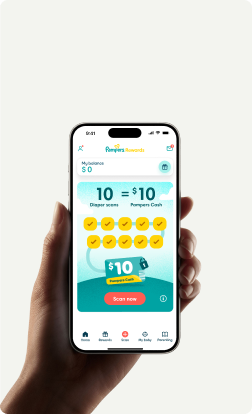Month 2
of pregnancy
Fetal development

Height
~0.5 in
Weight
~ 1/8 oz
Mothly highlights
- 1Baby’s Development. By the end of month 2, your little one transitions from embryo to fetus and is around ½ inch long. Facial features, eyelids, and early lung structures are forming, and cardiac activity is about 105 beats per minute.
- 2Bodily Changes & Symptoms. Morning sickness, fatigue, mood swings, constipation, and breast tenderness are all common. Heartburn, bloating, and food aversions may also appear. You’re likely not showing yet, but breasts may feel fuller or sore.
- 3Health & Wellness. Eat small, frequent meals, avoid greasy or spicy foods, and stay hydrated to ease nausea and indigestion. Ginger or light activity may also help. Call your provider if nausea is severe or persistent. Typical weight gain in the first trimester is about 1–5 pounds, but needs vary.
- 4Tips & To-Dos. Schedule prenatal visits, confirm your estimated due date, and continue taking prenatal vitamins. Review any medications with your provider, learn early warning signs, and begin tracking bump photos if you’d like. Many parents register for childbirth classes early since spots can fill quickly.
Checklist for month 2
- If you haven’t already, find out when you’ll get to meet your little one. Your healthcare provider will likely be able to give you an estimated due date at your first or next prenatal appointment; in the meantime, try our Due Date Calculator.
- Keep all of your prenatal appointments to make sure you and your little one are staying healthy.
- Focus on maintaining a healthy, balanced diet, and follow your healthcare provider's advice on starting or continuing to take prenatal vitamins.
- Although not everyone experiences morning sickness, lots of moms-to-be do, so read up on when morning sickness typically starts and ends to help you feel more prepared.
- Read up on pregnancy warning signs you shouldn’t ignore and find out who to call should you have any concerns if it’s outside your provider’s normal hours.
- Keep track of the growth of your bump in photos.
- Look for pregnancy and childbirth education classes in your area. It may seem soon, but you may need to register in advance to make sure you have a spot in the class you want.
- Download our guide to the first trimester. It will help you navigate the early stages of your pregnancy more easily.

Loyalty program
Are you starting to think about buying the first diapers for your baby?
Get exclusive recommendations and offers just for you to save hundreds of $$$ on Pampers

Get the Pampers Rewards app
Key Takeaways
At two months pregnant, you might be feeling overwhelmed, excited, worried, happy — or all of the above, and more. That’s pregnancy for you! There’s no doubt you’ll have a lot on your mind this month. Read on to learn more about common pregnancy symptoms, how your baby is developing during the coming weeks, and what else is in store for you at two months pregnant.
Common Pregnancy Symptoms at 2 Months Pregnant
At two months pregnant, some commonly experienced pregnancy symptoms include:
How Is Your Baby Developing This Month?
This month, your little one starts to develop a tiny nose, mouth, and ears. Eyelids have formed, and they’ll stay fused shut until the latter part of the second trimester. There’s also some important organ development happening this month. Your little one’s lungs now connect to the throat with breathing tubes. Like the lungs, the heart still has a lot of growing to do, but it’s now beating about 105 beats per minute — how about that! The amniotic sac is now developed and filled with amniotic fluid. Its important job is to house and protect your little one from now until birth. That’s not all! At the end of week eight, or approximately the end of your second month, there’s another exciting milestone: Your little one graduates from an embryo to a fetus, in medical terms, that is.
How Big Is Your Baby When You’re 2 Months Pregnant?
At the end of you being two months pregnant, your baby’s size could be about half an inch long, or in other words about the size of a raspberry.
What Does a Fetus Look Like at 2 Months?
Check out these illustrations for a glimpse at what your baby might look like when you’re two months pregnant:
2 Months Pregnant: Your Body’s Changes
Don’t expect to see too much of a belly bump at two months pregnant. At this stage, your body probably won’t look dramatically different. (Read more about when you might start showing.) What you might notice, though, is that in addition to some sensitivity and soreness, your breasts may look fuller. If your pre-pregnancy weight was within the normal BMI range, your healthcare provider may recommend a target weight gain of 25 to 35 pounds during your pregnancy, and at least two of these pounds will likely be gained by your breasts. Over the course of the first trimester, you are likely to gain about one to five pounds. Try our Weight Gain Calculator to learn how much weight you may be advised to gain during the rest of your pregnancy. Your healthcare provider is your go-to resource for advice about healthy weight gain and nutrition during pregnancy. Usually, you’ll only need to add about 300 extra calories to your diet each day, but this amount may increase later in your pregnancy. Your provider will be able to advise you based on your specific situation.
How Far Along Are You at 2 Months Pregnant?
At two months pregnant, you’re well into the first trimester, which spans week 1 to week 13. If you’re wondering how many weeks two months pregnant is, the answer can vary somewhat because weeks don't fit evenly into months, and you could be at the start or the end of your second month. So, you may want to think of two months pregnant as covering week five through week eight.
FAQs at a Glance
The first tiny movements you feel, known as quickening, usually aren’t perceptible until week 18 or even later. Hang in there! You’ll feel those little kicks before you know it!








